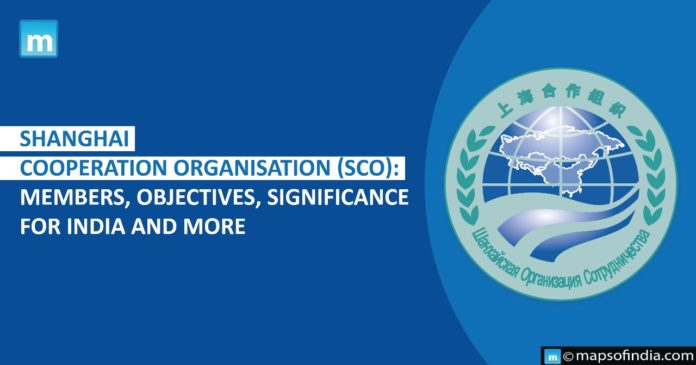Headquarter: Beijing
Official Language: Chinese and Russian
The Shanghai Cooperation Organization (SCO) is a multinational intergovernmental Institution. The Russian Federation, the People’s Republic of China, the Republic of Uzbekistan, the Kyrgyz Republic, The Republic of Kazakhstan, and the Republic of Tajikistan confirmed the establishment of the SCO in June 2001 in Shanghai (China). India and Pakistan were given the status of full members of the Organization at the historic summit of the Heads of Government Council of the SCO that took place in 2017 in Kazakhstan.
Members nations of SCO
There are nine members:
- Kazakhstan
- India
- Kyrgyzstan
- Pakistan
- China
- Tajikistan
- Uzbekistan
- Russia
- Iran
With the expansion of the Shanghai Cooperation Organization in Uzbekistan in 2022, Iran has become a permanent member of the SCO. Iran’s position was upgraded from observer to full-time, permanent member with the approval of the 8 SCO members. Interestingly, Iran submitted a full membership application to the group in 2008.
For more than 15 years, it served the organisation as an observer member. At the Samarkand conference, Iran was accepted as a full-time member of the SCO. There will be full participation from Iran at the SCO summit in 2023, which India will host.
There are three observer nations at present, and these nations are considering becoming full-time members, namely:
- Belarus
- Afghanistan
- Mongolia
Six dialogue partners
- Cambodia
- Turkey
- Nepal
- Azerbaijan
- Armenia
- Sri Lanka
Objectives
- To enhance the member nations’ collaboration in commerce, governance, innovation, business, tech, and culture and increase mutual trust and good community spirit among the member states.
- The sectors of the tourist industry, power and energy, environmental conservation, and education.
- Collaborating to uphold and preserve regional security, prosperity, and peace; working to construct a new, democratic, logical, and equitable global economic and political system.
- While the organisation conducts its external policy in conformity with non-targeting and non-alignment, its internal policy is centred on the fundamentals of mutual advantage, building cooperation, mutual discussions, inclusivity, and consideration for cultural diversity and a desire for shared development.
The Significance of the SCO for India
- The SCO is included as part of India’s stated objective of seeking multilateral alignment.
- The strategic and physical area that the SCO occupies is quite significant from an Indian standpoint. The interests of sovereignty, geopolitics, economy, and strategy are all entwined with changes in this region.
- India’s sovereignty and integrity are seriously threatened by the challenges of terrorism, instability, and extremism. There was a request from India for direct access to the RATS, the SCO’s counterterrorism organisation based in Tashkent. Moreover, India is interested in a stable Afghanistan, and RATS gives access to counterterrorism data that is not focused on Pakistan.
- It is challenging to get these resources when countries like Central Asia are isolated, and Uzbekistan is doubly landlocked. India has given the building of the International North-South Transport System priority in this respect. By joining the SCO, India can communicate with Central Asian nations.
- Natural resources and essential minerals abound in the Central Asian area. Cooperation in the energy sector is the main interest. However, an aggressive China that would promote its Belt and Road Initiative will also have to contend with India.
- Being a member of the SCO will assist India, which is now confined to the South Asian Region, to become a significant pan-Asian player.




